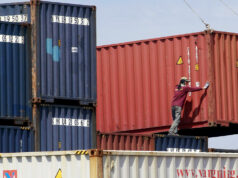IMF wants tax evasion covered by AMLA
THE Philippines should add tax evasion among the crimes covered by its law against money laundering, according to the International Monetary Fund (IMF).
“Tax evasion should be added to the list of predicate crimes,” the IMF said in its Feb. 6 report on the Philippines.
Customer due diligence for politically exposed persons and risk-based supervision of the gaming sector should also be intensified, it added.
Quirino Rep. Junie E. Cua said a technical working group of the House of Representatives Committee on Banks, which he heads, has been tweaking the Anti-Money Laundering Act (AMLA).
“It is one of the priorities of the government to enable us to achieve grade A rating, so that’s very important,” he said in an interview on Tuesday.
Mr. Cua filed House Bill 6174 to include tax crimes and violation of the Strategic Trade Management Act as predicate offenses to money laundering.
The bill also wants to include real-estate agents as covered persons that will be monitored by the Anti-Money Laundering Council (AMLC).
The congressman said his committee would address IMF concerns about tax evasion, saying it is “one of the areas where we need to improve.”
Mr. Cua said there is a long list of crimes that fall under tax evasion, some serious and some not so serious.
“We’re looking into that as well. But we need to be very careful with these things because we do not want also abuses to be committed,” he said.
The lawmaker said his committee was “fast-tracking” the measure “without sacrificing thorough and exhaustive consultations with stakeholders.”
These changes are needed so the country could avoid being gray-listed by the Financial Action Task Force (FATF), Mr. Cua said.
“This is about the international effort to curb the laundering of money resulting from terrorism, the funding or financing terrorism,” he added.
He also said they would look at the offshore gaming industry to ensure it does not become a dirty money haven.
“We don’t want it to become a venue for money laundering as well, and we want to be very cautious about these Philippine Offshore Gaming Operators,” he said.
The country’s law against money laundering was passed in September 2001 and was first amended in 2003 to address concerns about the high threshold level for covered transactions, the coverage of institutions and bank secrecy.
Lawmakers lowered the threshold for covered transactions to P500,000 from P4 million, empowered the central bank to examine deposits or investments with any banking institutions without a court order during a periodic or special examination, and allowed the law to be applied retroactively.
Congress again amended the law in 2012 by allowing the issuance of a freeze order and empowered the AMLC to conduct a bank inquiry within 24 hours after filing a court action.
The FATF upgraded the country to a “gray list” from a “dark gray” list as a result, just a notch away from being taken out of a watchlist of noncompliant nations.
The following year, lawmakers again changed the law by increasing the number of illegal activities related to money laundering to 34 from 14.
These included human trafficking, bribery, counterfeiting, fraud and other illegal exactions, forgery, malversation, various environmental crimes, and terrorism and its financing.
The law needs to be improved further so the Philippines won’t be included in the FATF list of areas with serious deficiencies in combating terrorist financing, the IMF said.
Meanwhile, Senator Francis N. Pangilinan filed a bill repealing a 65-year-old law that guarantees deposit secrecy.
His Senate Bill 634 or the proposed Deposits Disclosure Act will allow scrutiny of all deposits for possible tax evasion, money laundering and corruption, among other financial crimes.
This will cover all deposits, regardless of currency denomination, issued by banks and nonbank financial institutions.
“It is necessary and timely to lift all pertinent laws on the secrecy of bank deposits to ensure rightful declaration of taxes and efficient revenue collection,” Mr. Pangilinan said in the bill’s explanatory note.
“Through this measure, the government will be able to effectively combat domestic and global tax evasion, money laundering and other financial crimes, and corruption,” he added.
Once the bill becomes law, banks must disclose and report deposit account information. Violators will be fined at least P200,000 or jailed for at least three years or both. — Genshen L. Espedido and Charmaine A. Tadalan



